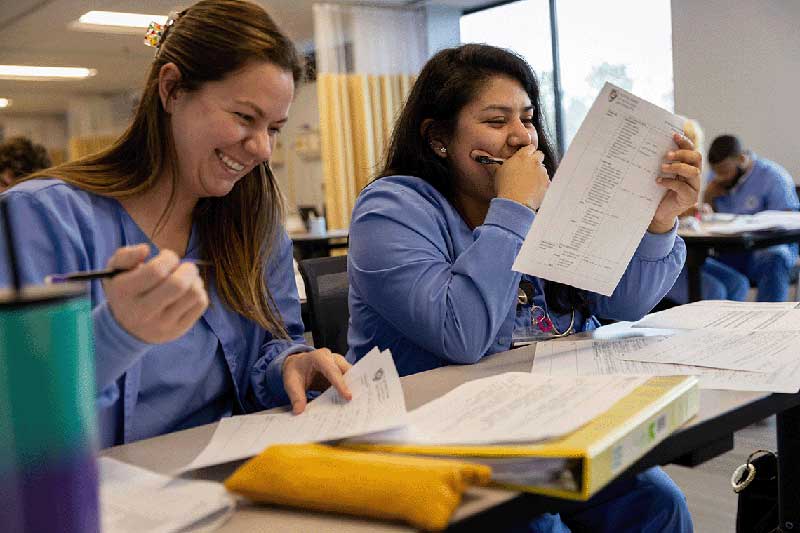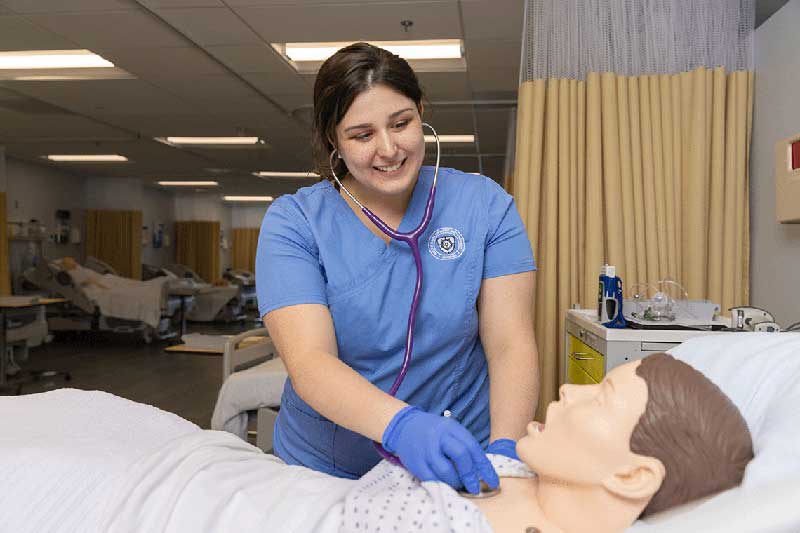What to Look for in a Nursing Program: 5 Steps for How to Choose a Nursing School
Each blog post is dated and contains accurate information as of that date. Certain information may have changed since the blog post publication date. If you would like to confirm the current accuracy of blog information, please visit our ABSN overview page or contact admissions at (866) 664-9033.
It can be hard to know what to look for in a nursing program, but generally, you’ll want to research the program’s admission requirements, program quality, NCLEX support, student resources and timeline. When deciding how to choose a nursing program, it’s important to consider all the factors.

Are you ready to take the first step toward a career in nursing through the Notre Dame of Maryland University Accelerated 2nd Degree Bachelor of Science in Nursing (ABSN) program? Before you call us or complete the form for more information, you need to be prepared.
For starters, you’ll want to know the answers to questions such as “How do I know what to look for in a nursing program?” and “How do I know I’ve found a quality program?”
When navigating how to choose a nursing school, these are smart questions to ask, as enrolling in a top-notch nursing program like ours sets a strong base for the rest of your nursing career.
Below we outline the steps to take for how to choose a nursing school, as well as list the top questions to ask nursing school admissions counselors.
Step 1: Familiarize Yourself with the Process
Step one of the process of how to choose a nursing school is to familiarize yourself with the admissions process. You’ll want to make sure you meet all the requirements and understand when deadlines are and how to meet them.
What are the admissions requirements?
You of course want to make the best impression when it comes to your application. When you decide you want to go to nursing school, make sure to research the application deadlines, requirements, and prerequisites of all the nursing schools you’re considering as soon as possible.
To become eligible for enrollment in NDMU’s accelerated nursing program in Baltimore, for example, you must first meet a set of ABSN requirements.
We understand the nursing school admissions process can seem daunting, especially if you’re transitioning from a career or field of study that has nothing to do with health care. That’s why you’ll be assigned a dedicated admissions counselor from your first contact with our ABSN program. They will help you determine what nursing school prerequisites you’ll need to complete (if any) to become eligible to apply, as well as assist you with achieving your desired start date goal.
Step 2: Research the Program’s Credentials
Next, if you’re going to dedicate your time and energy to earning a degree, you’ll want to make sure it’s a high-quality degree that earns respect from prospective employers.
Is the program accredited?
If you’ve ever researched nursing programs, you know that finding an accredited nursing school is important, but do you understand why? Nursing school accreditation matters because it means you can:
- Receive financial aid from the U.S. Department of Education.
- Transfer schools or pursue an advanced nursing degree. Graduating from an accredited nursing program ensures your ability to attend other accredited schools should you choose to pursue the advanced studies required to become a nurse educator, practitioner, nurse midwife, or nurse anesthetist.
- Have a competitive edge when searching for nursing jobs. In fact, many health care employers prefer to hire accredited practitioners educated under nationally established standards.
In addition to accreditation, it’s important to seek out a nursing school that is approved by its state board of nursing. A state board of nursing’s seal of approval grants you the ability to sit for the National Council Licensure Examination (NCLEX-RN®), the licensure exam every nursing graduate must pass to become an RN. If the school you’re considering is not approved by its state board of nursing, you may not meet the eligibility requirement to sit for the exam. Without the ability to take (and pass) the NCLEX, you won’t receive your nursing license.
You can rest assured knowing Notre Dame of Maryland University is regionally accredited by the Middle States Commission on Higher Education (MSCHE), while our BSN program is accredited by the Commission on Collegiate Nursing Education (CCNE) and approved by the Maryland Board of Nursing.
Step 3: Set Yourself Up for NCLEX Success
To become a practicing nurse, you must pass the NCLEX. This exam tests your nursing skills through long-form and multiple-choice questions as well as case studies. When considering what to look for in a nursing program, ensure you’ve found a program that adequately prepares you to pass with flying colors.

What are the school’s NCLEX pass rates?
The end goal of any quality BSN program should be how well it prepares you to sit for and pass the NCLEX. With a mix of online or classroom-based coursework (depending upon which program option you choose), skills and simulation labs, and clinical rotations at top health care facilities in the greater Baltimore metropolitan area, the Notre Dame ABSN program is designed to help you do just that.
As mentioned earlier, all state-approved nursing schools must report how many of their students pass this exam on the first attempt. How a BSN program’s first-time NCLEX pass rates compare to the national average for first-time test takers is also a great indicator of a school’s quality.
Step 4: Find a Support System
When preparing to enter a profession all about care, it only makes sense that you’d want a program that really cares about its students and supports student success. From academic resources to general support, Notre Dame has your back.
What academic support resources are available for students?
Your research of accelerated nursing programs may have led you to the conclusion that they are a major undertaking, both in time commitment and in academic rigor. What you’ve read and heard is true — nursing school is challenging, and this is especially true of accelerated nursing programs. That said, don’t let this stop you from pursuing your dream profession.

Get an inside look at a day in the life of a nursing student.
If the difficulty of nursing school is a concern, it’s a great idea to ask your admissions counselor about the academic support the program offers. Especially for any online-based program you may be considering, it’s important to understand how much access you’ll have to instructors and other faculty, as well as to the level of mentoring and other student support resources.
No matter which Notre Dame ABSN learning option you choose — online or campus-based — know you will never be on your own. In addition to faculty advisors who can help support and mentor students throughout the program, Notre Dame’s ABSN program also makes success coaches available to help students with time management, prioritization, test taking and developing effective study skills.
Step 5: Accelerate Your Nursing Education
If you’re eager to start your nursing career, one of your main priorities on the list of what to look for in a nursing program may be the timeline. Understanding how an accelerated program works and how soon you can start will be key.
How soon can I start?

If you’re looking for an accelerated nursing program to fast-track your nursing career, the answer to this question depends largely on how many prerequisites you need to take. If you have a bachelor’s degree in biology, for example, you may not need to complete as many prerequisite courses as someone with a bachelor of arts and less of an academic background in the sciences.
Additionally, some accelerated nursing programs, such as the Notre Dame of Maryland University ABSN program, offer three start dates per year, so you may be able to start earning your bachelor’s degree in nursing sooner than you think.
Of course, the most accurate answer to this question can come from a Notre Dame ABSN admissions counselor, who will work with you to determine whether our program is a match for your personal and professional goals.
Make the call to start your nursing future!
What are you waiting for? Now that you know exactly what to look for in a nursing program, the sooner you make the call and speak to an admissions counselor, the sooner you can get started on your new career as a Notre Dame of Maryland University nurse. Contact an admissions counselor today to get started.

